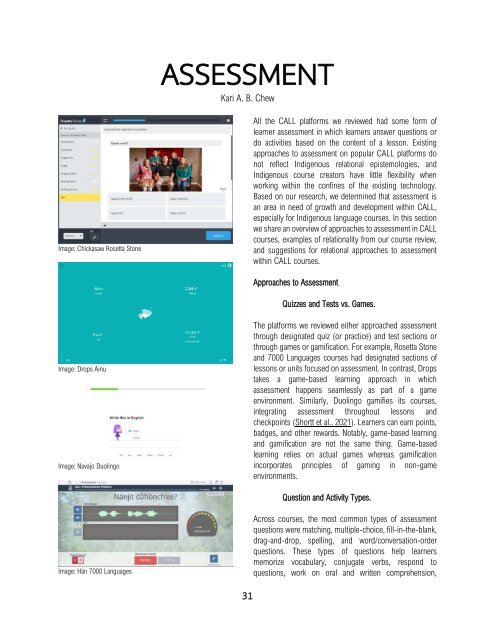Learning in Relation: A Guide to Creating Online Indigenous Language Courses that Center Indigenous Ways of Knowing and Being
by Kari A. B. Chew, Ph.D. (Editor & Author), Melvin Calls Him Jr. (Author), Jackie Dormer (Author), and Courtney Tennell (Author) The purpose of this guide is to share knowledge with Indigenous Nations and organizations, technology developers, and scholars who are working to center and respect Indigenous ways of knowing and being in online Indigenous language revitalization spaces, including Indigenous language courses. Citation Chew, K. A. B. (Ed.). (2022). Learning in relation: A guide to creating online Indigenous language courses that center Indigenous ways of knowing and being. http://hdl.handle.net/1828/14403
by Kari A. B. Chew, Ph.D. (Editor & Author), Melvin Calls Him Jr. (Author), Jackie Dormer (Author), and Courtney Tennell (Author)
The purpose of this guide is to share knowledge with Indigenous Nations and organizations, technology developers, and scholars who are working to center and respect Indigenous ways of knowing and being in online Indigenous language revitalization spaces, including Indigenous language courses.
Citation
Chew, K. A. B. (Ed.). (2022). Learning in relation: A guide to creating online Indigenous language courses that center Indigenous ways of knowing and being. http://hdl.handle.net/1828/14403
Create successful ePaper yourself
Turn your PDF publications into a flip-book with our unique Google optimized e-Paper software.
ASSESSMENT<br />
Kari A. B. Chew<br />
Image: Chickasaw Rosetta S<strong>to</strong>ne<br />
All the CALL platforms we reviewed had some form <strong>of</strong><br />
learner assessment <strong>in</strong> which learners answer questions or<br />
do activities based on the content <strong>of</strong> a lesson. Exist<strong>in</strong>g<br />
approaches <strong>to</strong> assessment on popular CALL platforms do<br />
not reflect <strong>Indigenous</strong> relational epistemologies, <strong>and</strong><br />
<strong>Indigenous</strong> course crea<strong>to</strong>rs have little flexibility when<br />
work<strong>in</strong>g with<strong>in</strong> the conf<strong>in</strong>es <strong>of</strong> the exist<strong>in</strong>g technology.<br />
Based on our research, we determ<strong>in</strong>ed <strong>that</strong> assessment is<br />
an area <strong>in</strong> need <strong>of</strong> growth <strong>and</strong> development with<strong>in</strong> CALL,<br />
especially for <strong>Indigenous</strong> language courses. In this section<br />
we share an overview <strong>of</strong> approaches <strong>to</strong> assessment <strong>in</strong> CALL<br />
courses, examples <strong>of</strong> relationality from our course review,<br />
<strong>and</strong> suggestions for relational approaches <strong>to</strong> assessment<br />
with<strong>in</strong> CALL courses.<br />
Approaches <strong>to</strong> Assessment<br />
Quizzes <strong>and</strong> Tests vs. Games.<br />
Image: Drops A<strong>in</strong>u<br />
Image: Navajo Duol<strong>in</strong>go<br />
The platforms we reviewed either approached assessment<br />
through designated quiz (or practice) <strong>and</strong> test sections or<br />
through games or gamification. For example, Rosetta S<strong>to</strong>ne<br />
<strong>and</strong> 7000 <strong>Language</strong>s courses had designated sections <strong>of</strong><br />
lessons or units focused on assessment. In contrast, Drops<br />
takes a game-based learn<strong>in</strong>g approach <strong>in</strong> which<br />
assessment happens seamlessly as part <strong>of</strong> a game<br />
environment. Similarly, Duol<strong>in</strong>go gamifies its courses,<br />
<strong>in</strong>tegrat<strong>in</strong>g assessment throughout lessons <strong>and</strong><br />
checkpo<strong>in</strong>ts (Shortt et al., 2021). Learners can earn po<strong>in</strong>ts,<br />
badges, <strong>and</strong> other rewards. Notably, game-based learn<strong>in</strong>g<br />
<strong>and</strong> gamification are not the same th<strong>in</strong>g. Game-based<br />
learn<strong>in</strong>g relies on actual games whereas gamification<br />
<strong>in</strong>corporates pr<strong>in</strong>ciples <strong>of</strong> gam<strong>in</strong>g <strong>in</strong> non-game<br />
environments.<br />
Question <strong>and</strong> Activity Types.<br />
Image: Hän 7000 <strong>Language</strong>s<br />
Across courses, the most common types <strong>of</strong> assessment<br />
questions were match<strong>in</strong>g, multiple-choice, fill-<strong>in</strong>-the-blank,<br />
drag-<strong>and</strong>-drop, spell<strong>in</strong>g, <strong>and</strong> word/conversation-order<br />
questions. These types <strong>of</strong> questions help learners<br />
memorize vocabulary, conjugate verbs, respond <strong>to</strong><br />
questions, work on oral <strong>and</strong> written comprehension,<br />
31




